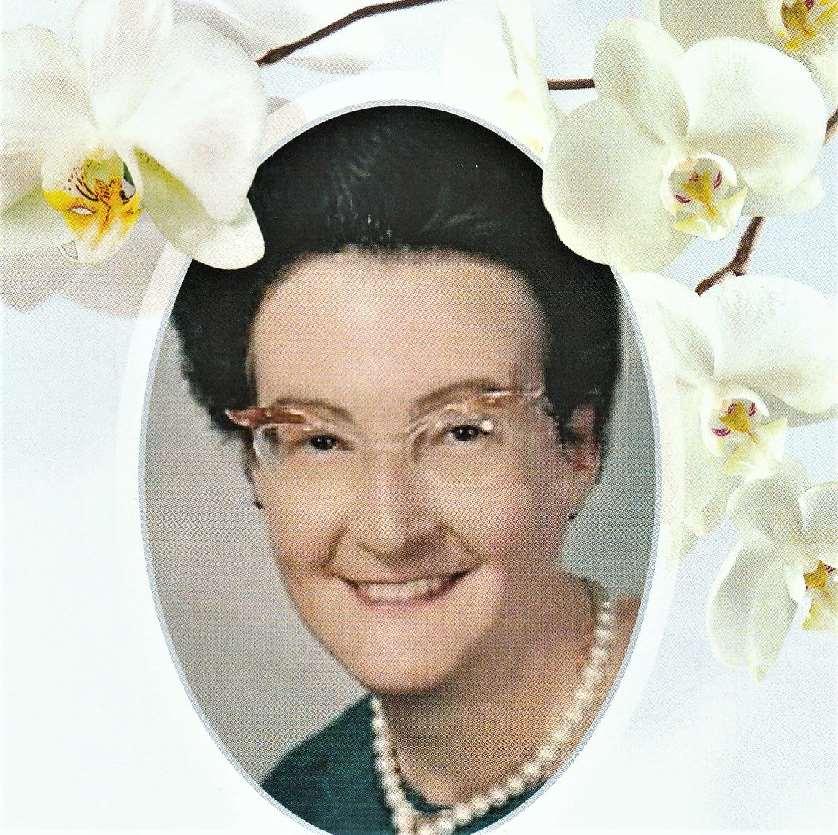
9 minute read
Daphne Bellman: An Obituary and Appreciation
Daphne was born in Willesden on 27 March 1924. Her earliest memory, at the age of four, was of being sick with the excitement and apprehension of the birth of her youngest brother, Brian, at home with a midwife in attendance. Brian watched the live stream of the funeral from his home in Maryland in the USA.
Daphne attended Willesden County Grammar School. She had vivid childhood memories of the years before the war, summer holidays at her mother's family home on the lsle of Wight being a particular highlight. But those happy years took place against the background of wartime preparations. She remembered the construction of an Anderson Shelter in their garden at Kensal Rise and was then evacuated with the rest of the school to Northampton for the early part of the war.

Keen to do her bit, aged 16, Daphne convinced her parents to let her leave school and return home to a clerical job in the “War Risks” department at the Royal London Mutual Assurance Society in Finsbury Square. She saw first-hand the devastating damage of the blitz as she commuted into the city each day. After one particularly bad night in December 1940, the radio announced that people should not go to work that day. Daphne went anyway. Three sides of Finsbury Square had been destroyed, buildings were still ablaze, rubble was everywhere, and rescued dray horses were tethered to lampposts. Later, when asked why she went in she replied, “Because I was stubborn and bloody-minded, I suppose”. Daphne was always a very determined lady!
Aged 18, in 1942 she joined the Women’s Land Army. Here she stands proudly in her uniform which she liked, all except the jodhpurs, “which took a lot of getting used to. It was the first time I had had a pair of trousers!” After training in Staffordshire, she was sent to what she described as a “distinctly primitive” dairy farm near Basingstoke.Regularly visited by her “boss” who checked on her welfare, after a year or so, she decided to visit her to ask for help in getting a transfer to a more modern farm. She walked the few miles to her “bosses” home which turned out to be a rather grand stately home. Nothing ventured, nothing gained, Daphne rang the huge front doorbell and was admitted by an intimidating butler to an audience with the Countess of Perth who readily and charmingly agreed to facilitate Daphne's move.

She spent the rest of the war on a farm on the Isle of Man, working 90-hour weeks on a tough hill-farm, getting into numerous scrapes with bulls and ploughs. lt was here that she acquired the first in a lifetime of dog companions - a Manchester Terrier.
Planning for the future, she learned shorthand and typing and procured a secretarial job with a family she really liked at a farm near Mapledurham in Berkshire. While there she read about the need for teachers due to the post-war “baby boom” and joined a one year “emergency training scheme” at an isolated college in the Chilterns with all accommodation provided. She enjoyed the intensive programme and embraced the challenges and opportunity to try new things. One example was the “fencing club”. At a time of great austerity, the fencing club had very little equipment. She said that the girls were advised to use saucepan lids for breast plates. She lost interest quickly as whenever an attack hit her visor her spectacles were dislodged!
After several school postings in south-east England, Daphne applied to the British Families Education Service and was posted to Dortmund where she lived in the officer’s mess which had previously been used by the SS. She found it an alarming place to stay and “couldn’t help thinking of the dreadful happenings there a few years previously”. She applied for the headship of a small primary school at Wulfen which rapidly expanded to 60-70 children. Travelling widely in Germany, it was in this period that Daphne emerged as a strong, confident young woman comfortable in the company of children and parents from all walks of life. When asked what it was like to live and work in Germany so soon after the war, she was quick to point out the goodness in most of the people she met, people who were struggling in the immediate aftermath of the war. She distinguished between them and the political system that was the real source of the conflict. She said it was easy to tell who had been a supporter of that system and those that had simply been swept along by events they could not control.
Having enjoyed her freedom for several years, Daphne had to return home because both her parents had become ill. She accepted the Headship of Launton Church of England School in 1966: living in the schoolhouse allowed her to continue her independence. We believe she was the last teacher to live in the house.
Daphne enjoyed the challenge of teaching two age groups at once which required a mixture of individual, group, and whole-class teaching. As the school roll increased Daphne concentrated on getting a sympathetically-designed new extension built. She completed the building of an open-air teaching swimming pool, enlisting volunteers from the community to get the job done. Later she became a prime mover in establishing the Launton Playing Field behind the school. She viewed all these things as a community effort and was eternally grateful for all the support she received from the parents and other villagers. It is amazing to think of the hundreds, probably thousands of lives that her efforts touched positively in her time in Launton. During her time in Launton, Daphne invited younger members of her family to come and stay. These visits were described as “based in the village, and we would arrive in time for a Sunday roast and this was often accompanied by an experimental recipe for perhaps a new side dish or more often a dessert - Daphne would announce that she was trying something out on us. Sometimes these things worked and sometimes they didn’t. Lunch was always followed by a walk, and back then the ground conditions in and around the village were sometimes quite, shall we say, damp. We would of course have wellies and Daphne would say “l’ve found a new dry walk” - usually within a few minutes we and the dog would be covered in mud much to everyone’s amusement.”
Once in the village, Daphne made Launton her home. She spent 17 very happy years as the head teacher of the school, and must have influenced the lives of hundreds of children who passed through the school in her time, but she had more time as a retired person in the village than she did working, and her retired years had a great impact on village life: some of the facilities that are here today Daphne most certainly had a hand in. There has been an overriding observation that if Miss Bellman approached you with a clipboard you were going to have to say yes.
Daphne lived happily in the schoolhouse for 10 years but looking to the future she started to seek her own home and having viewed around 20 properties in the village she settled on 3 Sharpe’s Cottages. She became very fond of her home despite the tiny garden that came with the property, but she managed to acquire a piece of the field behind from her friend Elizabeth Sharpe and set upon converting this into a wildlife garden, a project that gave her great pleasure.
She experimented with new hobbies such as embroidery, knitting, oil painting and genealogy. A legacy for Daphne will be the Millennium Church Kneeler project. She was an active participant in the town twinning of Bicester with Neunkirchen-Seelscheid where she enjoyed the exchanges of hospitality and the opportunity it gave to dust off her German language skills.
Retirement gave her more time for church and charity work. Having been raised a strict Methodist, she was amused in 1979 when the Parochial Church Council appointed her to be a churchwarden. In her time she was responsible for cataloguing St Mary’s graveyard and conducting a wildlife survey. She was a bellringer and would have loved that the bells will ring out for her funeral.
Many in the village have shared memories of Daphne with the family, who are touched by the high regard and affection with which she was held in Launton. To this day, apart from a select few, it is apparent that Daphne is, and would always be, MISS BELLMAN.
Daphne has been interred close to her parents in the old part of the churchyard. She was greatly respected and much loved by her family, friends and all who knew her, and she will be much missed.
Daphne put together a family genealogy with a brief note attached summarising what she considered important elements of her world view: “... The enclosed [is] about the lives of Daphne, Alan and Brian. I hope that this collection of reminiscences will interest the ... next few generations [of] the Bellman family, as we three have very vivid memories of the dreadful Second World War during our lifetime. The thought of future wars horrifies us all and we are now in 2021 faced with the appalling damage being done to our planet so I hope that all nations will learn to work together instead of fighting each other.”
This appreciation has been edited for Launton Lines from the eulogy given by Steve Bellman at the funeral in St Mary’s on 24 May 2023.





